The 'quintessentially English' home of a Russian spy
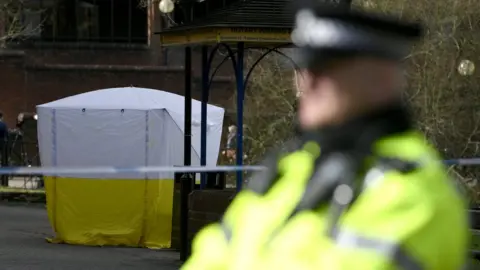 Google
GoogleIt is a city known mostly for its cathedral and proximity to Stonehenge. But as it finds itself at the centre of a modern-day mystery, what do the residents of Salisbury make of its new-found fame?
Quiet. Normal. Quintessentially English.
Words like these make medieval Salisbury seem an unlikely home for a former Russian spy.
And yet on Sunday, this small city in Wiltshire found itself the topic of global conversation when current resident Sergei Skripal became ill near the main shopping centre.
It would probably not have been newsworthy in itself, except it transpired he was once a military intelligence colonel who was convicted, and later pardoned, for passing the identities of Russian secret agents in Europe to the UK's intelligence service, MI6.
When the 66-year-old and his 33-year-old daughter Yulia Skripa were found unconscious on a bench near The Maltings, police soon revealed they believed the pair had been exposed to an "unknown substance".
Now, around the seat where they were found, a tent has been erected.
The nearby branch of Zizzi is closed - a tight-lipped police officer guarding the door. The Mill pub, about 200m from the restaurant, is also shut.
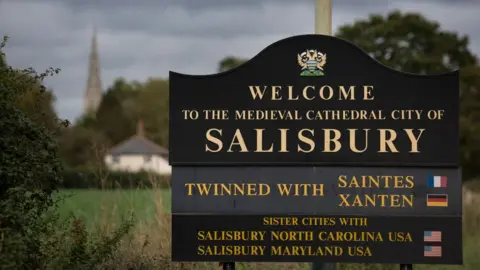 Getty Images
Getty Images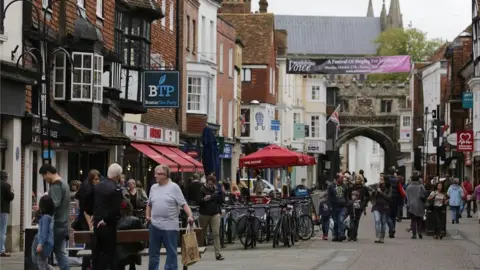 Getty Images
Getty ImagesBut far from perturbed by the activity unfolding around them, residents and workers simply zigzag around the cordons.
People are more worried about the local pie shop being closed, says Leuene Jackman, peering over the police tape at the forensics team.
"Quite a few shops have been closed, it won't be good for business," she remarks.
"You just think this sort of thing happens in other parts of the country.
"This is such a quiet city."
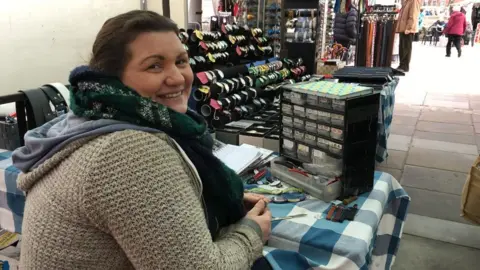
Typically known for its cathedral and proximity to Stonehenge, the city is one of the UK's smallest with a population of about 40,000 people.
It has been home to many celebrities with Sting, Madonna and Guy Ritchie among those living in nearby villages.
The late author Terry Pratchett and former prime minster Edward Heath also called Salisbury home.
Now a far less famous resident has given the city the dubious honour of making it an unwitting backdrop to an unfolding mystery that has the hallmarks of a spy novel.
"It's just weird," says Janice Parks on one of the main shopping thoroughfares.
"Salisbury is just so quintessentially English."
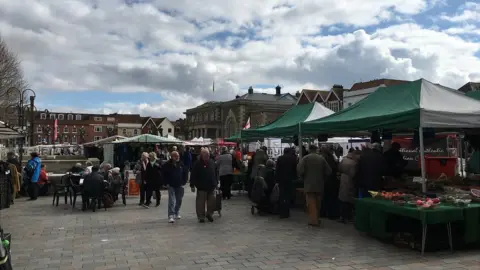
She hurries on, rejoining the other shoppers navigating the narrow alleys and busy marketplace.
"It's business as usual really," says stall holder, Amanda Barlow.
"People have been looking up into the sky a bit more than normal, watching the circling helicopter.
"It's such a sleepy, tight-knit place. We were quite surprised but it hasn't put people off visiting."
The hot topic of conversation in the cafes and shops has certainly been about "that Russian spy" - who despite the close-knit community cliché, seems relatively unknown to those milling around the streets.
"It goes to show we don't know who we live next door to," muses Penny Muxworthy, who lives just outside the city.
"People have jobs that might necessitate them [keeping from] people what it is that they do.
"It could happen anywhere."
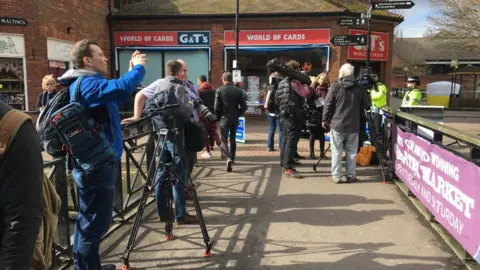
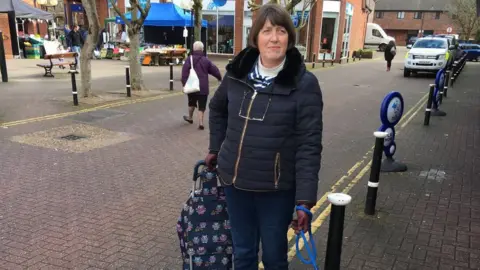
Outside the Mill pub, Frank Carter, agrees.
"Salisbury is out of the way isn't it," says the 87-year-old, who has lived there his whole life. "You wouldn't expect it here."
But many remain seemingly unruffled by the news.
"I'm not nervous for my own safety," says Sue Doe, smoking a cigarette a stone's throw from the closed Zizzi restaurant.
"I'm just interested to know what's happened."
Others are less keen about the attention it has attracted.
"You're not from the telly are you? I don't want to be on the telly," said a man who did not want to be named.
"There's cameramen and [media] on every street corner, you can't move for them."
For others, the publicity is a welcome moment in the spotlight.
"Well, it's definitely put Salisbury on the map," quips Doris Bright, before going about her day.
